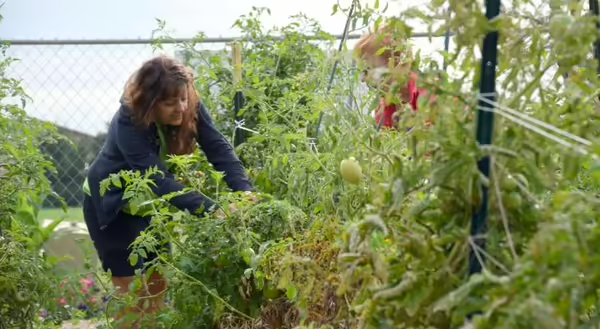
There are many reasons to grow your vegetables, including health benefits, better flavor, and environmental protection. The health benefits are exponential with the combination of nutrients, sunshine, and exercise gained through vegetable gardening.
Studies show that those who garden are more likely to eat more vegetables. Vegetables are a good source of essential nutrients such as calcium, vitamin A, potassium, and fiber for example. As you work outside in the sunshine, you are aiding your body in the production of vitamin D.
Walking, bending, lifting, and pulling movements that happen while gardening fit into the moderate excise category that can increase your body's immune system function. See this fact sheet about Training your Immune System for more information.
Certain vegetables such as broccoli, cabbage, and Brussel's sprouts produce a disease-fighting compound called sulfurane when cut. Colorful vegetables provide antioxidants such as lycopene and beta carotene. Diversity in the types of vegetables ensures balanced nutrition.
Freshly picked vegetables that you grew in your garden seem to taste better. Several factors determine taste. Different varieties of vegetables have different flavors. You can choose varieties for your garden to suit your tastes.
The flavor is also based on biochemical changes that happen to the produce once it is harvested. "Sugar stored in sweet corn kernels is being converted to starch as soon as the ear is harvested," says Nicole Flowers-Kimmerle, horticulture educator with the University of Illinois Extension serving Fulton, Mason, Peoria, and Tazewell counties. “Cook sweet corn as soon as you can for the most sweetness.”
Harvest time can also affect the flavor of the vegetable. In your garden, you can harvest your vegetables at their peak to ensure maximum flavor. For more information on the perfect time to harvest different vegetables go to the University of Illinois Extension A Taste of Gardening website.
Vegetable gardens benefit the environment in many ways. Locally grown vegetables reduce carbon emissions from burning fossil fuels. No plastic packaging is required when you harvest vegetables straight from the garden, which also reduces fossil fuel inputs. Pesticide and other chemical inputs can be much less in a small, well-tended garden than even a small farm.
Instead of your kitchen and yard waste going to a landfill, start a compost pile. A bonus is you are creating your own soil amendment to increase your garden's productivity. Visit the University of Illinois Extension site Composting Central for more information on composting for the home garden.
These health and environmental benefits can last even longer when you plant vegetables for fall harvest. Vegetables that grow well in cool weather such as leaf lettuce, radish, spinach, and turnips can be planted throughout August for a fall harvest. Visit the Illinois Extension website “Vegetable Garden Guide” at web.extension.illinois.edu/vegguide for planting dates.
For more information on how to start a vegetable garden, contact your local University of Illinois Extension office or visit the website extension.illinois.edu/.
MEET THE AUTHOR
Nicole Flowers-Kimmerle is a Agriculture and Natural Resources (Horticulture) Educator for Fulton, Mason, Peoria and Tazewell counties. She completed a bachelors of science degree in crop science at the University of Illinois, and a master’s of science degree in agronomy with an emphasis in weed science at the University of Wisconsin-Madison. She has also worked at Montana State University as a research associate where she worked on weed control in sugar beets and barley. She taught high school chemistry and other science classes where she was able to teach students in both the school garden and greenhouse. She works with both the Extension Master Gardeners and Extension Master Naturalists.
ABOUT THE BLOG
ILRiverHort is a blog that helps people connect to nature and grow.